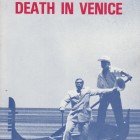Death in Venice 1983Scottish Opera
Read more about the opera Death in Venice
The operatic highlight of the 1983 Edinburgh Festival was undoubtedly the first visit by Opera Theatre of St Louis, with a new American work, The Postman Always Rings Twice (Paulus) and a rare British one, Fennimore and Gerda (Delius). There was also the fourth by the Hamburg company, their first since 1968. The Magic Flute production, at the vast Playhouse, was very different from its predecessors, and very entertaining. However a far more important event occurred at the more intimate King's Theatre, with the British premiere of two operas by Zemlinsky, both derived from Oscar Wilde, and presented as a double-bill. While the first piece, a three-hander called A Florentine Tragedy, worked well, it was overshadowed by the second piece. Zemlinsky's title, Der Zwerg (The Dwarf) was replaced by a restoration of Wilde's original, Der Geburtstag der Infantin (The Birthday of the Infanta). It proved to be a superb piece, well worthy of revival. The Usher Hall also contained two semi-operatic concerts, with Claudio Abbado on unfamiliar Wagnerian territory (Act 2 of Lohengrin), and Alexander Gibson and the local team tackling Schoenberg's huge Gurrelieder for the first time. Another Schoenberg rarity, the monodrama Erwartung, was also conducted by Abbado.
Perhaps it enjoyed a lower profile, but Scottish Opera's staging of Britten's Death in Venice, derived from the novella by Thomas Mann, fitted in well to the Festival's Viennese theme. It was a decade since the work had first appeared in Edinburgh, as part of its famous opening tour.
Scottish Operas's 1983/84 season at the Theatre Royal opened with Death in Venice, followed before Christmas by Idomeneo (also new), and revivals of The Golden Cockerel and Hansel and Gretel. In the New Year, the season continued with revivals of L'elisir d'amore, La bohème and L'Egisto, before a final new production, Turandot, opened. There was also a short tour of the medium-scale theatres with a double bill of early one-act farces by Rossini, The Marriage Contract and The Silken Ladder. The autumn saw a further handful of performances of the recent Jonathan Miller Magic Flute, while the second half of December featured a two-week run of a musical, My Fair Lady.
The company and Roderick Brydon added to their Britten repertoire, giving this work its first production in the UK since the original 1973 staging, and also its second outing at the Edinburgh Festival. Single performances in Glasgow and Edinburgh in August preceded its arrival in the main subscription season. The production team were from Geneva, and this staging was a co-production with that company - a promising collaboration which, sadly, went no further, possibly because a wonderfully elegant set designed for the large stage at the Grand Théâtre was too intractable to adapt easily to Scottish Opera's touring requirements and smaller theatres. Still, the gondolas whizzing about the stage looked fun.
Anthony Rolfe Johnson gave a marvellously subtle and detailed account of Aschenbach in his first attempt at the role. New Zealander Barry Mora's varied interpretations of the nemesis characters were every bit as accomplished as John Shirley-Quirk's had been back in 1973. Catherine Wilson also added a final character to her extensive Britten repertoire by acting the silent part of Tadzio's aloof and elegant mother. The multitude of small roles were taken by company regulars, either principals or chorus, in a way that would become impossible in later years.
Performance Cast
- Gustav von Aschenbach
- Traveller, Elderly Fop, Old Gondolier, etc
- Voice of Apollo
- Polish Mother
- Tadzio her son
- First Polish Daughter
- Second Polish Daughter
- Polish Governess
- Ship's Steward
- Hotel Porter
- Lido Boatman
- Hotel Waiter
- Strawberry-Seller
- Guide
- Glass-Maker
- Lace-Seller
- Beggar Woman
- Newspaper Seller
- Restaurant Waiter
- First Strolling Player
- Second Strolling Player
- English Clerk in Travel Bureau
- French Mother
- French Daughter
- Russian Mother
- Russian Father
- Russian Nanny
- German Mother
- German Father
- First American
- Second American
- Jaschiu's Father
- Danish Lady
- English Lady
- First Gondolier
- Second Gondolier
- Third Gondolier
- First Acrobat
- Second Acrobat
Performance DatesDeath in Venice 1983
Theatre Royal, Glasgow | Glasgow
20 Aug, 19.15 5 Oct, 19.15 8 Oct, 19.15 15 Oct, 14.15 18 Oct, 19.15 20 Oct, 19.15
King's Theatre, Edinburgh | Edinburgh
26 Aug, 19.30
Theatre Royal, Newcastle | Newcastle-upon-Tyne
17 Sep, 19.15
Empire Theatre, Liverpool | Liverpool
1 Oct, 19.15


